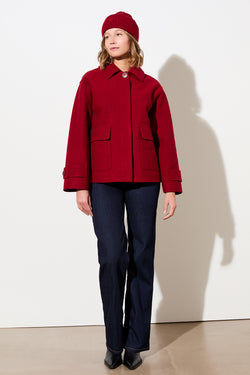
Organic wool differs significantly from conventional wool – in every step, from animal husbandry to the finished fabric. Our priority is to ensure that materials are not only functional and durable, but also responsibly produced.
A central issue is animal welfare, the way the animals are kept. Organic wool comes from sheep from controlled, organic livestock farming. The sheep live outdoors on pollutant-free pastures and are kept in a species-appropriate manner. They are not treated with prophylactic medications or antibiotics, as in conventional animal husbandry. Particularly important here is that the organic wool is mulesing-free. In mulesing, the skin around the lambs' tails is removed without anesthesia to prevent flystrike. This is a painful practice that is unfortunately widespread in conventional wool production. The Responsible Wool Standard (RWS) or Global Organic Textile Standard (GOTS) for certified wool, such as those used at LangerChen, strictly prohibits mulesing.
Organic wool also reduces environmental impact. The pastures are managed sustainably, and the use of chemical fertilizers or pesticides is prohibited. Strict standards also apply to subsequent production steps. Among other things, the use of chemicals is strictly regulated, and all work steps must be carried out in a socially responsible manner.

From sheep to fabric: How organic wool is made
- Shearing & Sorting: The sheep are sheared gently, and the raw wool is graded according to quality, length, and fineness.
- Washing: In several steps, the raw wool is freed of lanolin, dust, and plant residues. This is done without harsh chemicals.
- Carding & Combing: The fibers are aligned parallel, and short fibers are removed. This creates even combed yarns—the basis for fine yarns.
- Spinning & Dyeing: The combed yarns are spun into yarn and dyed as needed. Our wool supplier handles these steps with its own certified production facilities.
- Weaving/Knitting & Fulling: Yarns are used to create fabrics, which are then fulled. Heat, water, and movement cause the fibers to felt slightly. This makes the fabric denser, more durable, and naturally water-repellent.
- Manufacturing: In our LangerChen factory, the fabrics are transformed into durable garments. High-quality, fair, and sustainable.

For LangerChen, organic wool means the highest animal welfare standards, no mulesing practices, strict environmental regulations, and transparent supply chains. Together with our wool suppliers and our own GOTS-certified factory, we ensure that our jackets, parkas, and coats made of organic wool are not only functional and durable, but also carry a sense of responsibility – from the sheep to the finished fabric.



